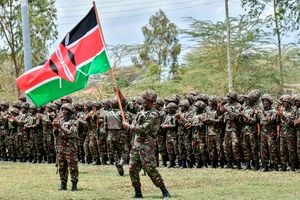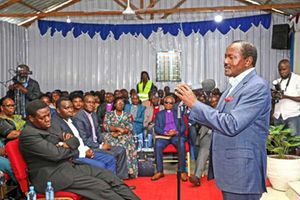Medics, lawyers protest SRC plan to abolish allowances

Salaries and Remuneration Commission chairperson Lyn Mengich. Health workers have protested against the move by SRC to do away with non-practice allowances.
What you need to know:
- Health workers have protested against the move by the Salaries and Remuneration Commission (SRC) to do away with non-practice allowances.
- The SRC has invited public comments on its proposal to abolish the non-practice allowance in public service. Its removal could see thousands of public service workers, including lawyers, lose the perk.
- The non-practice allowance was introduced to attract and retain scarce professional skills in the public service.
Health workers have protested against the move by the Salaries and Remuneration Commission (SRC) to do away with non-practice allowances.
The SRC has invited public comments on its proposal to abolish the non-practice allowance in public service. Its removal could see thousands of public service workers, including lawyers, lose the perk.
The non-practice allowance was introduced to attract and retain scarce professional skills in the public service. At the time, the government was worried that trained professionals would go into private practice, making it hard for the low-paying public sector to attract top talent.
Doctors in job group L – the lowest rank – have been earning Sh12,000 in non-practice allowance while those in the highest job groups, S and T, have been earning Sh60,000.
SRC says there is a glut of doctors and lawyers in the market eliminating the need to continue paying the allowance.
“Over the years, the capacity and need for professional skills in the public service has progressively grown to fill the gap for which the non-practice allowance was payable,” said SRC.
“Consequently, SRC proposes to advise the national and county governments that non-practice allowance be abolished and ceases to be payable,” it added.
The Kenya Medical Practitioners, Pharmacists and Dentists Union (KMPDU) Secretary-General Davji Atela, however, said SRC has “no power to abolish allowances” and that health workers fill fight the push to remove the perk.
“You cannot reduce the pay of a worker. SRC should not overstep its mandate because its role is just to recommend what actions other government stakeholders should take,” Dr Atela said.
Workers' shortage
He added that Kenya still has a shortage of health workers and therefore the allowance ought to stay in place to attract more workers to the public sector.
“The fact that the government does not employ doctors does not mean that the country has achieved the numbers of doctors required. Health workers depend on this allowance to boost their earnings which are low,” he said.
Lawyers have also vowed to oppose the proposed removal of the allowance, arguing that it makes a significant part of the gross pay of government lawyers.
“We will oppose any attempts to remove the allowance because the amount of work done by government lawyers is huge. Instead of abolishing the allowance, the conversation that we need to be having instead is how the allowance can be raised,” Law Society of Kenya President Eric Theuri told the Nation yesterday.
KMPDU last month took SRC to court over the proposal to abolish the allowance, arguing that the non-practice allowance is contained in the Collective Bargaining Agreement (CBA) signed by the union and the government on June 30, 2017. The case will be mentioned today.
According to the SRC, where the payment of the allowance is negotiated under a CBA, the allowance will be retained until the CBA lapses.
“While issuing advice on parameters for subsequent collective bargaining negotiations, SRC will progressively review the allowance in CBAs and align it with the advice above,” said SRC.
The non-practice allowance is one of the four allowances that SRC has recently recommended be eliminated. The commission has also recommended the abolishment of retreat allowance, sitting allowance for institutional internal committee members, and task force allowance, saying they amount to double pay.
Presently, there are over 247 remunerative and facilitative allowances in the public service.





